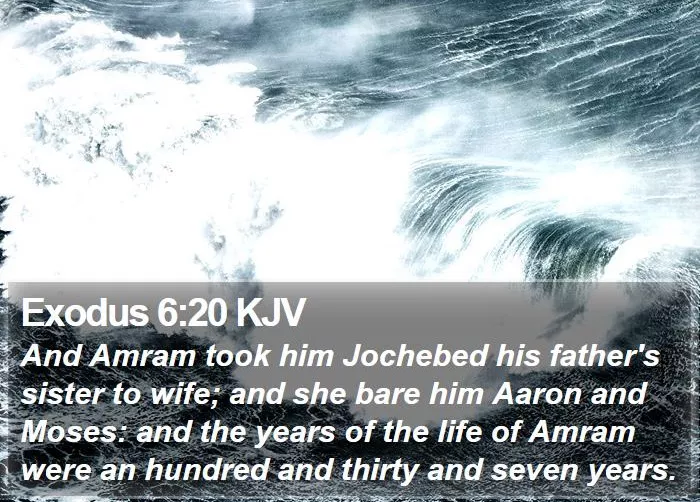Read the Daily Bible Verse – Exodus 6:20 To Strengthen Your Spiritual Journey.
Exodus 6:20 is a pivotal verse in the genealogical record of Moses and Aaron, offering insight into their lineage and the fulfillment of God’s redemptive plan for Israel. This verse states:
“And Amram took him Jochebed his father’s sister to wife; and she bare him Aaron and Moses: and the years of the life of Amram were an hundred and thirty and seven years.”
This genealogical detail reveals the human roots of the deliverers chosen by God to lead Israel out of bondage. It situates Moses and Aaron within the Levitical family, emphasizing God’s use of human lineage in accomplishing His divine purposes. Understanding this verse requires examining its historical, theological, and practical implications.
The Context on Exodus 6:20 KJV
The broader context of Exodus 6:20 is the narrative of God’s deliverance of Israel from Egypt. Chapter 6 begins with God reaffirming His covenant with Abraham, Isaac, and Jacob, declaring His intent to deliver Israel and establish them as His people (Exodus 6:2-8). This chapter is significant because it highlights God’s faithfulness amidst the Israelites’ despair over Pharaoh’s oppression.
Amid this backdrop, verses 14–27 serve as a genealogical interlude, identifying the lineage of key figures like Moses and Aaron. This record places them within the tribe of Levi, highlighting their priestly heritage and divine appointment for leadership. Exodus 6:20 specifically identifies Amram, a Levite, as their father, and Jochebed, his aunt, as their mother. This detail not only establishes their familial background but also foreshadows the leadership roles Moses and Aaron would assume in fulfilling God’s covenant promises.
The Exodus 6:20 Meaning
Genealogical Significance
Exodus 6:20 underscores the divine orchestration of lineage in God’s plan. By detailing Moses and Aaron’s ancestry, the verse connects them to Levi, the tribe set apart for priestly service. This genealogy validates their roles as leaders and mediators between God and His people.
The marriage between Amram and Jochebed, though unconventional by modern standards, aligns with cultural norms of the time. Such unions within extended families were not uncommon in ancient Israel, particularly among the Levites, to preserve tribal identity and inheritance.
Leadership and Legacy
The mention of Moses and Aaron in the same verse highlights their complementary roles. Moses, as the deliverer and lawgiver, and Aaron, as the high priest, symbolize the unity of God’s leadership and priesthood. Their roles foreshadow the ultimate fulfillment of deliverance and priesthood in Christ.
God’s Sovereignty in Human History
The specific ages and genealogical records emphasize God’s control over history. Amram’s lifespan of 137 years reflects the longevity often associated with patriarchal figures, symbolizing stability and continuity in God’s redemptive plan.
Exodus 6:20 Application in Life
Embracing God’s Call Despite Humble Origins
Exodus 6:20 reminds believers that God often calls ordinary people from unremarkable backgrounds to accomplish extraordinary purposes. Moses and Aaron, though born into slavery, were chosen to lead a nation to freedom. This encourages individuals to trust God’s plan for their lives, regardless of their circumstances.
Valuing Family and Spiritual Heritage
The verse highlights the importance of family in shaping one’s spiritual identity. Believers are called to honor their spiritual heritage and nurture future generations in faith, ensuring the continuity of God’s work.
Recognizing God’s Sovereignty
The genealogical details remind believers that God is intricately involved in the details of their lives. Trusting His sovereignty brings comfort and assurance, especially during challenging times.
See Also: Exodus 6:19 Meaning, Context & Commentary
Comparison with Other Biblical Texts
Genesis 46:11
This verse identifies Levi and his descendants, establishing the tribal roots of Moses and Aaron. It provides the foundation for understanding their role as part of the priestly lineage.
Numbers 26:59
Numbers 26:59 reiterates the details of Exodus 6:20, emphasizing the significance of Moses and Aaron’s parentage. This repetition highlights their divine appointment and reinforces their legitimacy as leaders.
Hebrews 3:1-6
The New Testament links Moses and Christ, portraying Moses as a faithful servant in God’s house and Christ as the Son who fulfills the work. This comparison underscores the typological significance of Moses’ role in the broader redemptive narrative.
Modern-Day Relevance
Leadership Rooted in Faith
Exodus 6:20 challenges modern leaders to recognize that effective leadership begins with faith and submission to God. Moses and Aaron’s example encourages leaders to trust God’s guidance and serve with humility.
Honoring Spiritual Foundations
In a world that often neglects the past, this verse calls believers to honor their spiritual heritage. It reminds Christians to remain rooted in their faith, drawing strength from God’s promises and the examples of faithful ancestors.
Finding Identity in God’s Plan
In an age of identity crises, Exodus 6:20 offers reassurance that each person’s life is part of God’s grand narrative. Believers can find purpose and meaning by aligning their lives with God’s will.
Conclusion
Exodus 6:20 is more than a genealogical record; it is a testament to God’s faithfulness in fulfilling His covenant promises. By detailing the lineage of Moses and Aaron, this verse underscores the divine orchestration of leadership and redemption. It challenges believers to trust God’s plan, honor their spiritual heritage, and embrace their role in His kingdom work.
Exodus 6:20 Commentary
Exodus 6:20 invites reflection on God’s use of ordinary people for extraordinary purposes. Amram and Jochebed, though living in an era of oppression, became the parents of two of the most significant leaders in Israel’s history. Their faithfulness in raising Moses and Aaron amidst adversity reflects the importance of nurturing godly leaders.
Furthermore, this verse illustrates God’s sovereignty in orchestrating history. The genealogical details affirm that every aspect of life, even familial relationships, is under His divine control. This truth offers comfort and assurance, reminding believers that their lives are part of a greater plan.
In conclusion, Exodus 6:20 is a powerful reminder of God’s faithfulness, sovereignty, and redemptive purposes. Its lessons transcend time, offering hope and encouragement to believers today.
Related topics:


